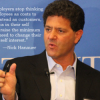Nick Hanauer

Nick Hanauer
Nick Hanaueris an American entrepreneur and venture capitalist living in Shoreline, Washington...
NationalityAmerican
ProfessionBusinessman
CountryUnited States of America
accepted became economies jobs money people poured prosperity sort top understand view
We became enthralled with the view that wealth trickled down from the top and that if you poured money into rich people, sort of like an ingredient, prosperity and jobs would squirt out of them like donuts. And if you understand economies in the 19th-century way, that view is plausible, and I think a lot of people accepted it.
business cost create devote equally fewer jobs key people profit revenue time
Business people do two things with their time fundamentally. The first is that they try to create sales, right? Revenue, key to business. But the other thing they devote their time to equally is cost containment. That is to say, how to not create jobs. Because the fewer jobs you can create for the revenue you create, the more profit you make.
jobs thinking two
Now one person doing the job of one and a half. So as an employer I can get two people to do the work of three, and think about what that does for profits.
jobs creating squirrels
When businesspeople take credit for creating jobs, it is like squirrels taking credit for creating evolution. In fact, it's the other way around.
jobs unemployment wages
My message is that the counterclaim - which is that if wages go up, employment will go down - is a scam. It's a con job. It's an intimidation tactic. There is absolutely no evidence anywhere that it's true. On the contrary, where you find high wages you usually find low unemployment.
jobs would-be today
If it was true that lower taxes for the rich and more wealth to the wealthy leat to job creation, today we would be drowning in jobs.
benefits business ceos companies economic era growing higher rather renewed share value wages
Once America's CEOs get back to the business of growing their companies rather than growing their share prices, shareholder value will take care of itself, and all Americans will share in the higher wages and other benefits of a renewed era of economic growth.
achievement buy corner difference economic history jeff job middle people stuff
If Jeff Bezos and I had started Amazon.com in a poverty-stricken corner of Africa, there would have been no job creation because there would be no people to buy the stuff from Amazon.com. The difference here is the American middle class, which is by every measure the most extraordinary economic achievement in the history of the world.
companies congo created lots low people places somalia starting taxes
If low taxes were the way that people like me created wealth, then we'd be starting our companies in the Congo or Somalia or Afghanistan, but we're not. We come to places where there are lots and lots of customers.
art becomes crappy people prosperous society specialize work
In a sufficiently prosperous society where people specialize sufficiently, and where enough of the crappy work is done by machines, all work becomes art.
essence future guy happen headed intuition mediocre seeing sets smartest technical word
I'm not the smartest guy you've ever met, or the hardest-working. I was a mediocre student. I'm not technical at all - I can't write a word of code. What sets me apart, I think, is a tolerance for risk and an intuition about what will happen in the future. Seeing where things are headed is the essence of entrepreneurship.
amount change degree economics evidence forces numbers others poorer prefer prejudices richer themselves
The most powerful forces in economics are not numbers or facts. They are prejudices and preferences. No amount of evidence will ever change the degree to which many of the rich and powerful prefer themselves to be richer and more powerful and others poorer and weaker.
campaign good hour man minimum nobody opponents proposing roll straw
During Seattle's successful campaign for a $15 an hour minimum wage, our opponents would sometimes roll their eyes and snort, 'If $15 is so good, why not $50?' It was a straw man argument: Nobody was proposing a $50 minimum wage; it would have been too high, and we said so.
money monopoly quite
The thing about a real economy is that it actually is like the game of Monopoly in the sense that when one person has all the money, the game is over. And in a game of Monopoly, of course, that's quite charming, but in a real economy, it's much more problematic.